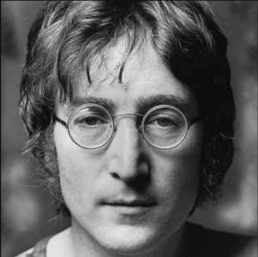These life stories may contain descriptions of childhood trauma and abuse, as well as images, voices and names of people now deceased. If you need help, you can find contact details for some relevant support services on our support page.
English singer and songwriter, and co-founder of the Beatles, John Lennon (1940-1980), grew up in kinship care.
John Winston Lennon was born to Julia Stanley and Alfred Lennon in Liverpool, England. Alfred, a merchant seaman, was often away and Julia was left alone with their son. By 1942, Alfred had abandoned his relationship with Julia, and his son. Concerns about Julia led to John being given to one of Julia’s four sisters, Mary, or ‘Aunt Mimi’ as John called her.
John was the son that Mimi never had, and she brought him up with passionate affection but also with strictness and an eye to middle-class standards (Middleton).
John continued to see his mother and it was she who taught him to play guitar. However, in 1958 Julia died in a car accident in front of Mimi’s house, just three years after Mimi’s husband, the only father John had known, had died.
John was restless at school, but was taken by rock ‘n’ roll as a young teenager. By 1957 he was attending Liverpool College of Art where he trained in the visual arts, had formed a skiffle band called ‘The Quarry Men’, and was playing locally in regular gigs. Paul McCartney joined the band in 1957.
…lead guitarist George Harrison [joined] in early 1958, and Lennon’s fellow art student and best friend Stuart Sutcliffe was also in the group at this stage. After several attempts to find the right drummer, Pete Best joined in 1960. The group’s local reputation grew as Lennon pushed its repertoire away from skiffle and towards rock ‘n’ roll, and he and McCartney began writing songs together. At last John Lennon had found a focus for his talents (Middleton).
Local record shop owner, Brian Epstein, became the manager of the newly named Beatles—widely regarded as the “most important musical group of the second half of the 20th century”—in 1961 and the McCartney original, ‘Love me do’ became a hit the following year.
Of the four Beatles singles released in Britain in 1963, three reached number one, to be followed by two more in 1964. In April 1964, immediately after their first American tour, the Beatles had five singles occupying the top five positions in the US Billboard singles chart. Two albums in each year—Please Please Me and With the Beatles followed by A Hard Day’s Night and Beatles for Sale—all reached number one in Britain, and featured a mixture of cover versions and Lennon–McCartney original compositions. From January 1963 appearances on television (including the Ed Sullivan Show in the USA) became commonplace, and the feature film A Hard Day’s Night, a comic pseudo-documentary of the Beatles’ frantic lifestyle directed by Richard Lester, was a great success in 1964 (Middleton).
John Lennon, along with the other Beatles, received a MBE (Member of the Order of the British Empire) in 1965. He returned the medal in 1969, along with a note to Queen Elizabeth:
“Your Majesty, I am returning this in protest against Britain’s involvement in the Nigeria-Biafra thing, against our support of America in Vietnam and against Cold Turkey slipping down the charts.
“With Love, John Lennon of Bag” (BBC).
By 1969 John Lennon wanted out of the Beatles. By then he had begun collaborating with Yoko Ono and he formally changed his middle name to Ono. John and Yoko Lennon moved to New York in 1971. He was killed there on 8 December 1980.
John Lennon was posthumously inducted into the Songwriters Hall of Fame in 1989, and into the Rock and Roll Hall of Fame in 1994.
References:
Christgau, Robert. “John Lennon British Musician”. Encyclopaedia Britannica. https://www.britannica.com/biography/John-Lennon
Middleton, Richard. “Lennon, John Ono (1940-1980)”. Oxford Dictionary of National Biography, 2017. https://www.oxforddnb.com/view/10.1093/ref:odnb/9780198614128.001.0001/odnb-9780198614128-e-31351
“Queen’s honours: People who have turned them down named.” BBC News, 26 January 2012. https://www.bbc.com/news/uk-16736495
Spencer, Neil. “Being John Lennon: A Restless Life by Ray Connolly review – just a complicated guy”. The Guardian, 15 October 2018. https://www.theguardian.com/books/2018/oct/15/being-john-lennon-a-restless-life-ray-connolly-review
Image available here.
